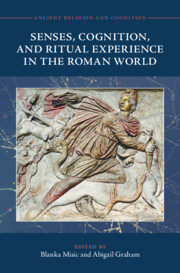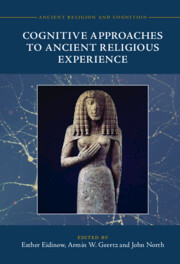Refine search
Actions for selected content:
3 results in Ancient Religion and Cognition

Visiting the Oracle at Dodona
- Contexts of Unknowing in Ancient Greek Religion
- Coming soon
-
- Expected online publication date:
- February 2026
- Print publication:
- 12 March 2026
-
- Book
- Export citation

Senses, Cognition, and Ritual Experience in the Roman World
-
- Published online:
- 04 January 2024
- Print publication:
- 25 January 2024
-
- Book
-
- You have access
- Open access
- Export citation

Cognitive Approaches to Ancient Religious Experience
-
- Published online:
- 28 July 2022
- Print publication:
- 11 August 2022
